Geoffrey Petts
There have been some really excellent books about quackery this year. This isn’t one of them, because
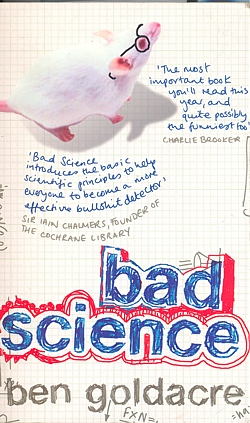 |
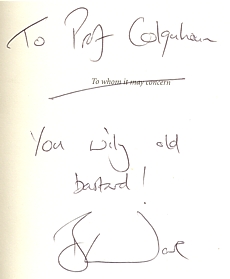
Nice dedication uh? |
it is about a lot more than quackery It is about the scientific method in general. and in particular about how often it is misunderstood by journalists. Abuse of evidence by the pharmaceutical industry is treated just as harshly as abuse of evidence by homeopaths and you get the low-down on both.
“More importantly, you will also see how a health myth can be created, fostered and maintained by the alternative medicine industry using all the same tricks on you, the public, which big pharma uses on doctors. This is about something much bigger than homeopathy.” (p.28)
Sir Iain Chalmers, a founder of the Cochrane Collaboration , co-author of the best lay text on evidence says: “Bad Science introduces the basic scientific principles to help everyone become a more effective bullshit detector”. And there is no more invaluable skill than being a bullshit detector.
Chalmers says also “Ben Goldacre has succeeded where the ‘public engagement in science’ organisations have so signally failed.” That is exactly right. ‘Public engagement’ has rapidly become bureaucratised, and at its worst, is no better than a branch of the university’s marketing department. This sort of public engagement corrupts as much as it enlightens. Goldacre enlightens, and he also makes you laugh.
In the introduction, Goldacre says
“You cannot reason people out of positions that they didn’t reason themselves into.” (p xii)
It’s a nice point, but the rest of the book makes a magnificent attempt to do just that.
There is quite a lot about medicine, of course, that’s his job, after all. But it isn’t all quackery by a long chalk Quackery is merely a good hook to hang the arguments on about how you distinguish what’s true from what isn’t. That’s partly because quacks make every mistake known to mankind (sometimes through ignorance, sometimes just to boost sales), and partly just because it is a topic that interests people, and with which they are bombarded every day I feel exactly the same. If I were to talk about the statistics of single ion channels, nobody would read it (big mistake -it’s fascinating), but if one can use the case of honey versus cough medicine to explain the analysis of variance, there is a chance that someone might find it interesting.
As much as anything, Goldacre’s book is about C.P. Snow’s two cultures. The chapters on the distortion and trivialisation of science in the media are just terrific.
“My basic hypothesis is this: the people who run the media are humanities graduates with little understanding of science, who wear their ignorance as a badge of honour. Secretly, deep down, perhaps they resent the fact that they have denied themselves access to the most significant developments in the history of Western thought from the past two hundred years.” Chapter 11, p. 207
“.. . . here is the information I would like from a newspaper to help me make decisions about my health, when reporting on a risk: I want to know who you’re talking about (e.g. men in their fifties): I want to know what the baseline risk is (e.g. four men out of a hundred will have a heart attack over ten years); and I want to know what the increase in risk is , as a natural frequency [not as relative risk] (two extra men out of that hundred will have a heart attack over ten years). I also want to know exactly what’s causing that increase in risk -an occasional headache pill or a daily tub full of pain-relieving medication for arthritis. Then I will consider reading your newspapers again, instead of blogs which are written by people who understand research , and which link reliably back to the original academic paper, so that I can double check their précis when I wish. ” (p. 242)
I detect some ambiguity in references to things that aren’t true. Sometimes there is magnanimity. At other times he is a grade one kick-ass ninja. For example
I can very happily view posh cosmetics -and other forms of quackery -as a special, self-administered, voluntary tax on people who don’t understand science properly (p. 26)
Of course nobody wants to ban cosmetics, or even homeopathy. But a lot of bad consequences flow from being over-tolerant of lies if you take it too far (he doesn’t). The lying dilemma and the training dilemma are among them. Some unthinking doctors will refer troublesome patients to a reflexologist. That gets the worried-well out of their surgery but neglects the inevitable consequence that Human Resources box-ticking zombies will then insist on having courses that teach the big toe is connected to the kidney (or whatever) so that reflexologists can have an official qualification in mystical mumbo-jumbo.
Is there anything missing from the book? Well inevitably. There are plenty of villains among the peddlers of nutri-bollocks, and in the media. But there isn’t much about the people who seem to me to be in some ways even worse. What about the black-suited men and women in the Ministry of Health and in some vice-chancellors’ chairs who betray their institutions and betray the public through some unfathomable
mixture of political correctness, scientific ignorance and greed? What about the ludicrous behaviour of quangos like Skills for Health? You have to wait right to the end of the book to hear about universities. But when it comes, it is well worth the wait.
“I’m not surprised that there are people with odd ideas about medicine, or that they sell those ideas. But I am spectacularly, supremely, incandescently unimpressed when a a university starts to offer BSc science courses in them.” (p. 317)
It’s almost worth buying Ben Goldacre’s book for that sentence alone.
This book is a romp through the folly, greed and above all the ignorance of much in our society. It’s deeply educational. And it makes you laugh. What more could you want?
| Last year, Nature published a pretty forthright condemnation of the award of Bachelor of Science degrees in subjects that are not science: in fact positively anti-science. This topic has come up again in Times Higher Education (24 April 2008). A league table shows that the largest number of anti-science courses is run by the University of Westminster [download paper version]. |
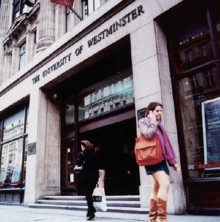 |
Vice chancellors have consistently refused to answer letters, from me, from the Times Higher Education or from the BBC, asking them to defend their practices.
The vice chancellors union, Universities UK, has simply refused to consider this very basic threat to academic standards.
It is particularly amazing that vice-chancellors continue to support courses in homeopathy when they have been condemned by no less a person than the head honcho of homeopathy in the UK, Dr Peter Fisher. He is clinical director of the Royal London Homeopathic Hospital and Homeopathic Physician to the Queen. Peter Fisher and I were interviewed on BBC London News after publication of the Nature article. At the end, Fisher was asked by the presenter, Riz Lateef, about whether homeopathy was a suitable subject for a science degree.[Watch the movie]
| Riz Lateef (presenter): “Dr Fisher, could you ever see it [homeopathy] as a science degree in the future? Dr Peter Fisher: “I would hope so. I wouldn’t deny that a lot of scientific research needs to be done, and I would hope that in the future it would have a scientific basis. I have to say that at the moment that basis isn’t comprehensive. To that extent I would agree with Professor Colquhoun.” |
The one exception was a response, of sorts, that I got from Westminster University.
I can interpret this lack of response only as a sign of guilt on the part of the vice chancellors of the 16 or so universities who teach this stuff. That interpretation is reinforced by the refusal of two of them to release their teaching materials, despite requests under the Freedom of Information Act 2000. Both the University of Central Lancashire and the University of Westminster have turned down appeals, and refused to hand over anything. The former case has been with the Information Commissioner for some time now, and if the ruling goes as a hope, the taxpayer may soon be able to see how their money is being spent.
But the wonderful thing about the electronic age is that it has become really quite difficult to keep secrets. Last year I managed to find an exam paper set by the University of Westminster in Homeopathic Materia Medica, and a question from that paper has already appeared in Nature.
I recently acquired copies of a course handbook. and of the powerpoint slides used for the lecture on ‘Vibrational Medicine’ by the University of Westminster. This appears to be from a course in Complementary Therapies, part of “Health Sciences: Complementary Therapies BSc Honours”, according to Westminster’s web site. A lot of people have access to this first year course material, so Westminster needn’t bother trying to guess how I got hold of this interesting material
In the public interest, here are a few quotations. Taxpayers should know how their money is being spent.
According to the handbook
“Complementary Therapies is a core module for the Therapeutic Bodywork, Herbal Medicine, Homœopathy, Nutritional Therapy and Complementary Therapies courses. Therefore all students of these degree courses are required to take this module.”
The University of Central Lancashire also has “Vitalistic Medicine” as part of its BSc Homeopathy (but, like Westminster, has some excellent people too).
There is a rather good Wikipedia entry on Vitalism, a topic that is now largely the preserve of cranks.

The handbook is wonderful. The word ‘evidence’. in the context of ‘does it work?’, does not occur a single time. There is plenty of the usual edu-bollocks jargon that is so beloved by bureaucrats, but not the slightest hint of critical thinking about assessment of the ‘therapies’.
The course seems to be a romp through almost every form of battiness known to humankind. Not just homeopathy, traditional Chinese medicine and nutritional therapy, but also dowsing, crystal healing and other forms of advanced delusional thinking. Before somebody grumbles, let me emphasise that ‘nutrition’ is to be distinguished from ‘nutritional therapy’: the latter involves imaginative claims that buying expensive supplements can prevent or cure almost anything. There’s a lot more about that here, and here.
Here are just 5 days from the timetable.
| 9am-1.00pm : Homœopathy (group work and video) |
| 9am-1.00pm : Traditional Chinese Medicine |
| 9am-10.45pm : BODYWORK THERAPIES |
| 11.15-1.00pm : Nutritional Therapy |
| 9am-1.00pm : Vibrational Medicine/Energy Concepts (L&P) |
All this can be yours -at a cost.
Full-time UK/EU fee – £3,145
Full-time Overseas fee – £9,450
The slides for the last of these lectures show some of the most glorious examples of the abuse of sciencey-sounding words that I’ve seen in a while.
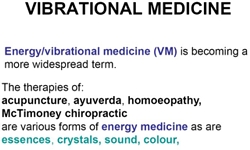 |
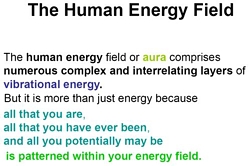 |
Sigh. All this is sheer imagination. It is ancient vitalism dressed up pretentiously in sciencey words.Then a bit later we come to the general theory -“energy concepts”.
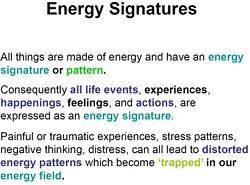 |
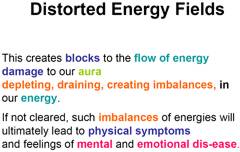 |
More plausible-sounding, but utterly meaningless words about vibrations. And then on to old superstitions about dowsing with rods and pendulums.
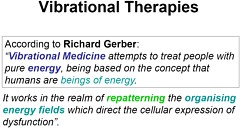 |
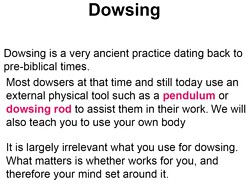 |
.
Not a single word of scepticism appears about any of this mumbo jumbo. Can it get worse? Yes it can. CRYSTAL HEALING comes next.
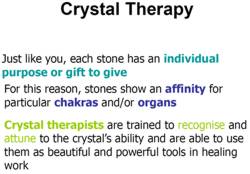 |
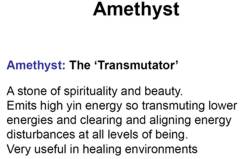 |
Are you having difficulty in understanding what all these words mean? I certainly hope so, because they have no meaning to understand. Don’t worry too much though, There are some helpful diagrams.
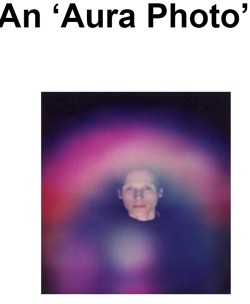 |
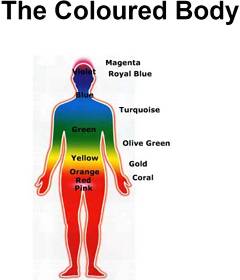 |
Aura photographs? They are just fairground conjuring tricks. Well, that is what you thought. But here we see them presented, apparently in all seriousness, as part of a vocational bachelor of science degree in a UK
university.Never mind, it is all assessed properly, with all the right box-ticking jargon. The course handbook says
| Learning Outcomes On successful completion of this module you will be able to: • describe the theoretical basis and classification of a range of complementary therapies |
What theoretical basis? There isn’t any theoretical basis, just a meaningless jumble of words.
You just couldn’t make it up.
Westminster University is not all like this
This post is not intended as an attack on the University of Westminster as a whole. Last year I had an invitation from their biomedical people to give a talk there. They asked for a talk on “What is is the evidence for Alternative Medicine?”. But then I got an email from them saying
“I was surprised to be sat on heavily on return from said trip by the VC, Provosts and Deans (including Peter Davies the leader of the Alt Med School !) once news of your talk leaked out. Could you give a talk on your research instead- yep I know its pusillanimous of me and yep I know unis stand for freedom of speech and yep I know that fellow members of staff suggested you come and others were keen to listen to your views on quackery.”
So on November 2nd 2007 I gave a seminar about single ion channel work (our new ideas about partial agonists). Of course all the excellent staff whom I met agreed with me about the embarrassment that having degrees in homeopathy etc. The fault lies not with their academic staff, but with their administration. Freedom of speech does not seem to be high on their agenda.
Postscript I recently learned that when Times Higher Education asked Westminster about my seminar, they were given the following statement.
“Prof David Colquhoun was invited to take part in a research seminar series organised by the University’s School of Biosciences last year. As part of this series, on Friday 2 November 2007, he gave a talk on the agreed topic of “Single ion Channel studies suggest a new mechanism for partial agonism” – his area of research.”
Perhaps I am naive, but it truly shocks me that a university can issue such a dishonest account of what happened.
